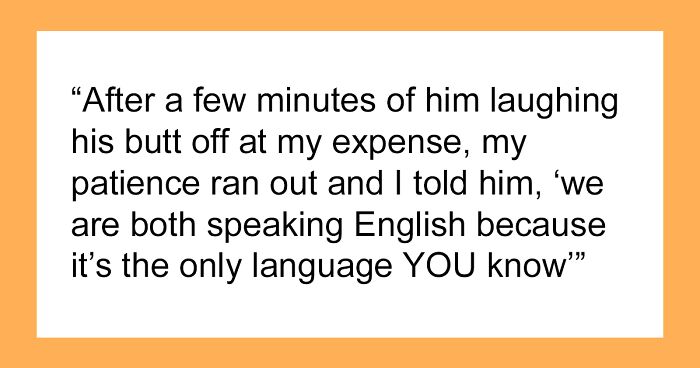
Person Who Knows 3 Languages Puts Rude American In His Place: “The Only Language You Know”
Mocking someone for mispronuncing a word is a jerk move no matter the circumstances; unless, maybe, it’s a good friend and you do it in a gentle teasing kind of way. But ridiculing someone’s pronunciation when it’s their second, third, or Xth language, especially when you’re monolingual yourself, is definitely not right.
Yet that’s exactly what happened to this redditor. Being trilingual himself, the OP was mocked by his American friend for the way he pronounced a word in English. But the mocking didn’t last long, after the redditor clapped back at said friend.
Scroll down to find the full story below, where you will also find Bored Panda’s interview with Dr. Viorica Marian, Professor of Communication Sciences and Disorders at Northwestern University and author of best-selling book The Power of Language: How the Codes We Use to Think, Speak, and Live Transform Our Minds.
Being able to communicate in several languages is not something everyone can do
Image credits: GaudiLab / Envato (not the actual photo)
However, some people, like this netizen’s friend, mock a multilingual person knowing only one language themselves
Image credits: kegfire / Envato (not the actual photo)
Image credits: Expensive-Print7397
Most Europeans believe that everyone should speak at least one foreign language
Image credits: Image by Freepik (not the actual photo)
Learning a foreign language is not always easy. In some instances, it can actually be very, very difficult. (I am certain that having to learn numbers in French or verb conjugation in Lithuanian, just to name a couple of examples, have pushed many learners to the brink of tears.) Be that as it may, a number of people manage to master a second, a third, a fourth language and sometimes even more.
The Eurobarometer survey carried out in 2023 found that in Europe, for instance, most people have positive attitudes towards multilingualism and value language diversity; nine-in-ten of them believe that everyone should speak at least one other language than their mother tongue. In most cases, that one other language is English, which close to half of Europeans (47%, to be exact) have mastered to some extent, making it the most popular foreign language in the region.
According to the survey, the youth—people between ages 15 and 24—seem to be especially motivated or interested in learning foreign languages. Out of them, roughly four-in-five are able to carry out a conversation in a language that they are not native to (marking a 5% increase since 2012). Out of Europeans of all ages that are proficient in a foreign language, close to a third reportedly use it on a daily basis.
“Knowing multiple languages is like a superpower,” expert says
If you’re wondering what motivates people to learn a foreign language, the aforementioned survey suggests that job opportunities are a big motivator, encouraging roughly half of Europeans to delve deeper into language learning. Other benefits they see in said activity include being able to understand people from other cultures and using it on holidays abroad.
Learning or practicing a foreign language is also good exercise for the brain. “Being bilingual and multilingual has multiple benefits for the brain, for aging, and for cognitive, social, and economic outcomes,” says Northwestern University professor and author of The Power of Language: How the Codes We Use to Think, Speak, and Live Transform Our Minds, Dr. Viorica Marian.
“Knowing multiple languages is like a superpower that helps delay the onset of Alzheimer’s and dementia, improves cognitive control, benefits metalinguistic and metacognitive skills, and boosts creativity, in addition to immediately noticeable benefits like being able to communicate with people who speak other languages, facilitate travel, and making one eligible for jobs in which knowing a specific language is required.”
But it’s not only the benefits of learning a language that are fascinating; the way our brain reacts to languages—foreign or native—is, too. A study delving deeper into the way the brain of a polyglot—a person who can speak five or more languages—works found that it expends comparatively little effort when processing their native language compared to a foreign one.
English is the most commonly spoken language in the world
Image credits: peoplecreations / Freepik (not the actual photo)
The US, too, is home to millions of bilingual and multilingual people. Though English is the official language, according to the United States Census Bureau (as of 2019), close to 68 million people in the US spoke a language other than English at home. The most frequently spoken languages, other than English, were Spanish or Spanish Creole, Chinese, Tagalog, Vietnamese, and Arabic respectively.
According to Statista’s 2023 data, Spanish and Chinese were among the most common languages not only in the US, but in the entire world as well. Taking into consideration all of the speakers (not only those to whom it is a foreign language), English is the most common one worldwide, followed by Chinese (Mandarin), Hindi, Spanish, French, and Arabic respectively.
Because of his background and his interest in the English language, the OP was fluent in three of the five most commonly spoken languages in the world, while his friend, Max, spoke one. That was one of the reasons why said friend mocking his pronunciation made the redditor snap back at him, which some netizens believed to be too strong of a reaction. Many, however, agreed that Max was being a jerk to the OP, too. Both sides shared their thoughts in the comments.
Many netizens believed that Max was in the wrong for mocking his friend
Some, however, thought that the OP was a jerk to some extent, too
Poll Question
Thanks! Check out the results:
Especially the one that said "it seemed like he was just having fun at your expense"! Uh, yeah, that's the actual problem - it was at OP's expense!
Load More Replies...No, he was being mean and tried to cover it up as a joke when called out.
Definition of joke or prank: only if the other person (who is suject of joke/prank) considers it funny as well. Period.
Load More Replies...If I joke about your pronunciation, you can joke about my lack of languages. it's fair game, I started it, I should be prepared for consequences. ¯\_(ツ)_/¯ Tho the guy (Max) seems like he was being an a*s about it and it wasn't actually said in a fun, joking way, and was used to mock them. He definitely deserved that comeback lol
Especially the one that said "it seemed like he was just having fun at your expense"! Uh, yeah, that's the actual problem - it was at OP's expense!
Load More Replies...No, he was being mean and tried to cover it up as a joke when called out.
Definition of joke or prank: only if the other person (who is suject of joke/prank) considers it funny as well. Period.
Load More Replies...If I joke about your pronunciation, you can joke about my lack of languages. it's fair game, I started it, I should be prepared for consequences. ¯\_(ツ)_/¯ Tho the guy (Max) seems like he was being an a*s about it and it wasn't actually said in a fun, joking way, and was used to mock them. He definitely deserved that comeback lol

 Dark Mode
Dark Mode 

 No fees, cancel anytime
No fees, cancel anytime 





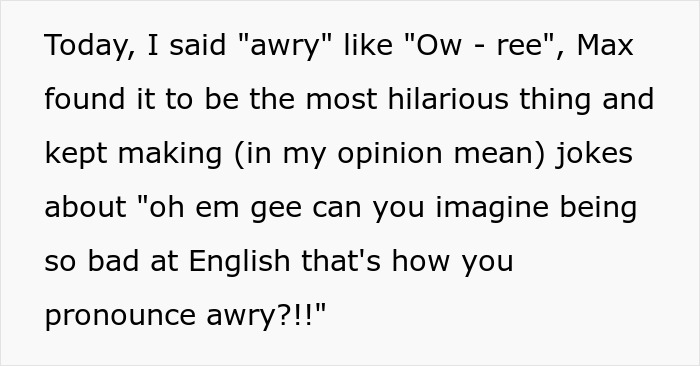















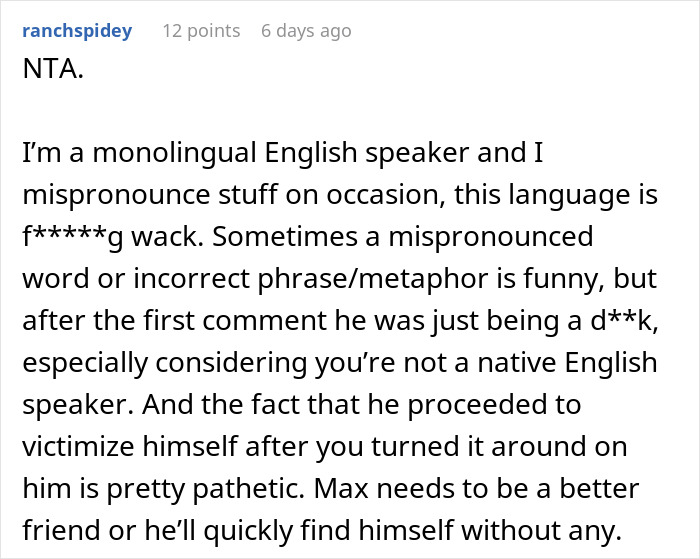

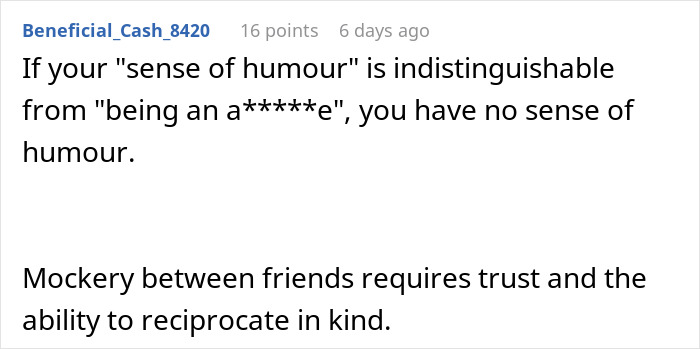
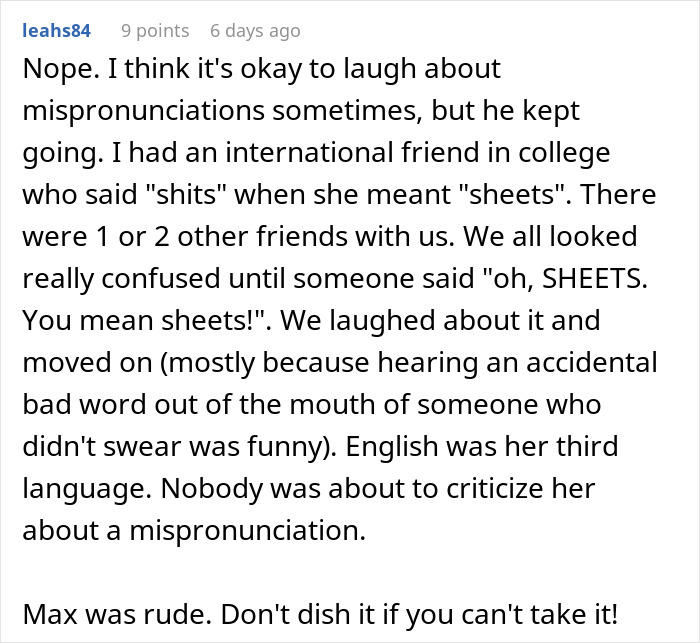






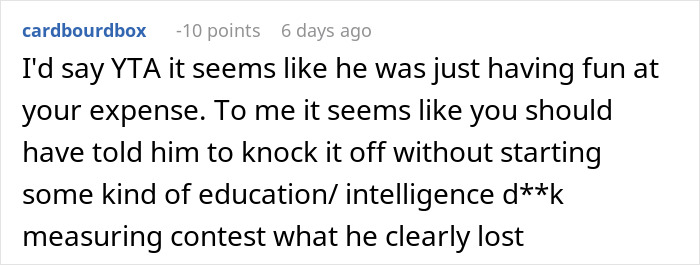


























39
83